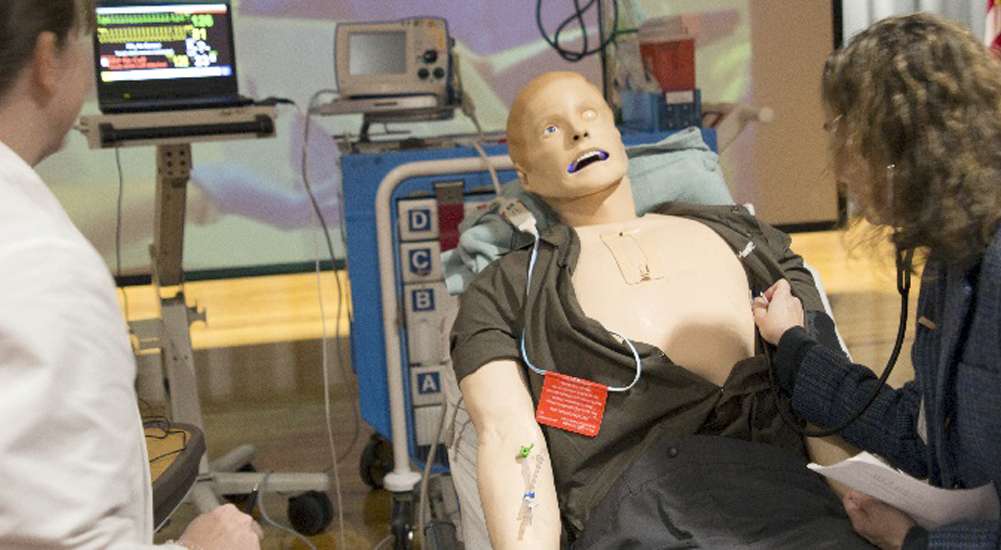What started off with a few manikins and task trainers at the San Antonio VA has grown into a full-blown Simulation Center.
San Antonio VA received some exciting news last month. The simulation center received SimLEARN Innovation Cell for Education (SLICE) accreditation.
Simulation Program Director Debbie Bartoshevich said that San Antonio is now only the 11th center in the VA network. Although proud of those stats, she said that is not why this accreditation is critical for South Texas.
“The certification allows our simulation center to support the deployment of a standardized simulation education, evaluation and data collection method.”
Able to teach national programs with remote learning
The impact of the sim center goes beyond the South Texas campus.
“The simulation center can now educate local facility instructors to teach national programs through remote learning,” Bartoshevich said.
Associate Director for Patient Care Services and Nurse Executive Valerie Rodriguez-Yu said she sees the impact in the most important of factors…patient safety.
“Simulations such as mock codes in the outpatient clinics and suicidal or missing patients in various settings through the health care system allow staff to engage in critical circumstances they may not frequently encounter,” Rodriguez-Yu said. “This prepares them to deliver safe and effective care when the need arises.”
Bartoshevich and her team of nurses and techs can frequently be found in the therapy pool, or even a stairwell, setting up a mock code to test the next provider that comes by.
Have trained over 3,000 employees
Another simulation center contributor and collaborator, Suicide Prevention Coordinator Larry Stokes, developed SAVE sim training with Bartoshevich and said they have trained over 3,000 employees.
For Bartoshevich, simulation is a labor of love. She has faced a few hurdles to get to accreditation. One of those hurdles is that technology is expensive. Another common issue is space or having to yield space for expanding COVID units.
She was forced to relocate after a historic winter storm that caused water damage to some of the facility. Now the center has expanded to another floor and includes critical care beds to facilitate organizational needs. Bartoshevich and her team tailor training to meet staff needs.
Reduces risk of injuries and infections
“We work with our chief resident of patient safety, quality and simulation, who trains residents in simulation on high-risk procedures,” Bartoshevich said. “This has reduced the risk of Veteran injuries and infections.”
In addition to resident training, the simulation center has also developed programs in fall prevention, safe patient handling and cardiac events.
The South Texas Veterans Health Care System is the fastest growing VA healthcare system in the country. That growth means training demands have also gone up. In 2019, there were 2000 hours of training conducted. Just one year later, that figure doubled to 4000 hours while tripling learners with 5,709.
Rodriguez-Yu has witnessed this growth and transformation in not only the simulation center but the nursing service.
“Over the years, the San Antonia VA sim center has continuously elevated the bar and amplified their ability to provide innovative simulations for our staff,” Rodriguez-Yu said. “This has benefitted our nurses tremendously by allowing them to increase competency in dealing with high-pressure situations and improve critical thinking skills. They practice skill-based and non-skill-based techniques in a safe and supportive environment.”
Not resting on her laurels, Bartoshevich is on a full court press.
“We have secured funding for new equipment; ultrasound, chest tube, tracheostomy and bone marrow task trainers,” she said.”
Also, she said they are adding two more simulation technicians by the end of 2021 to add to the four-person staff manning the manikins at present. These actions will set up the organization to provide quality care to the nation’s heroes well into the future.
Topics in this story
More Stories
Bob Jesse Award celebrates the achievements of a VA employee and a team or department that exemplifies innovative practices within VA.
The Medical Foster Home program offers Veterans an alternative to nursing homes.
Watch the Under Secretary for Health and a panel of experts discuss VA Health Connect tele-emergency care.







